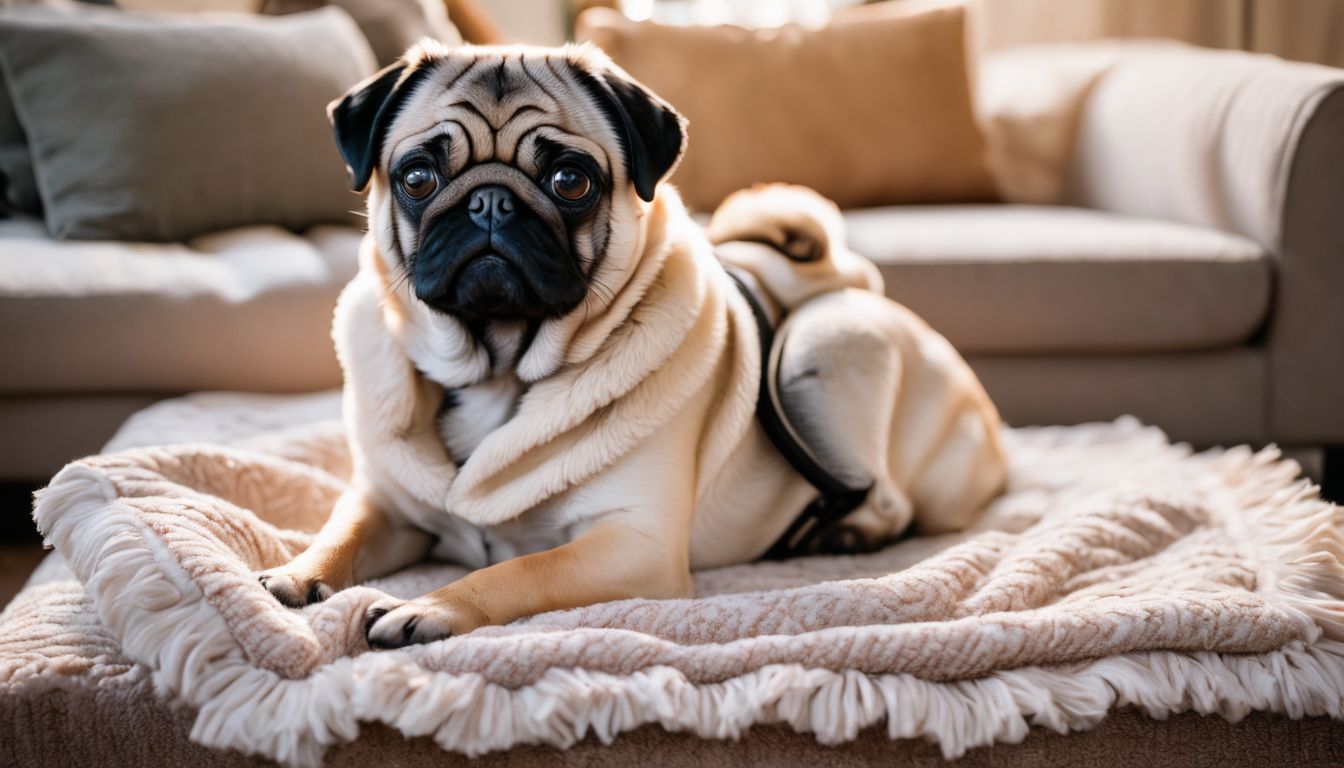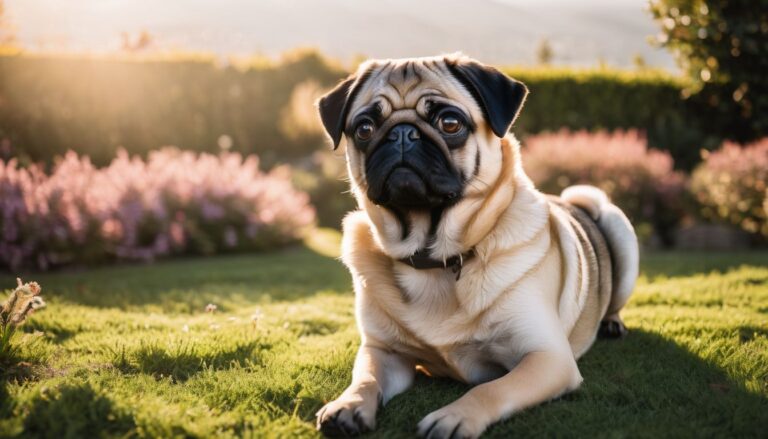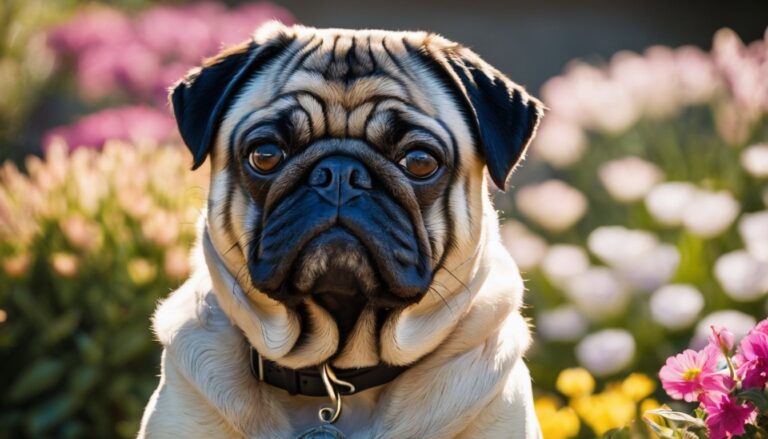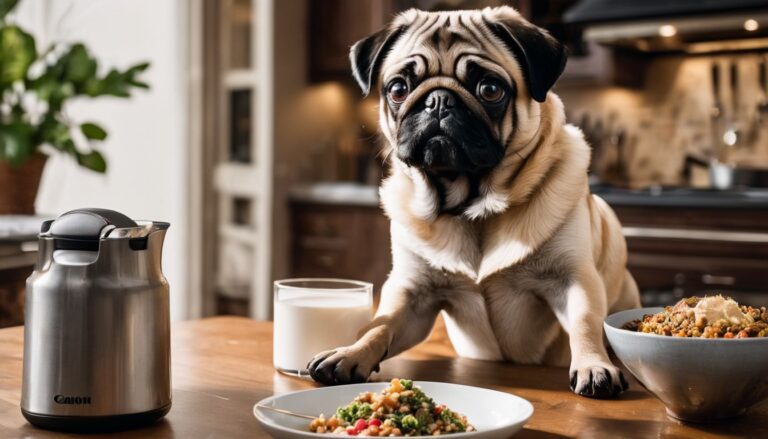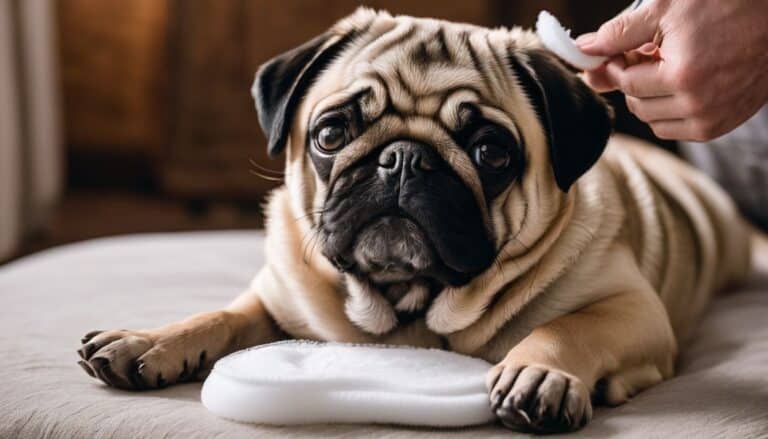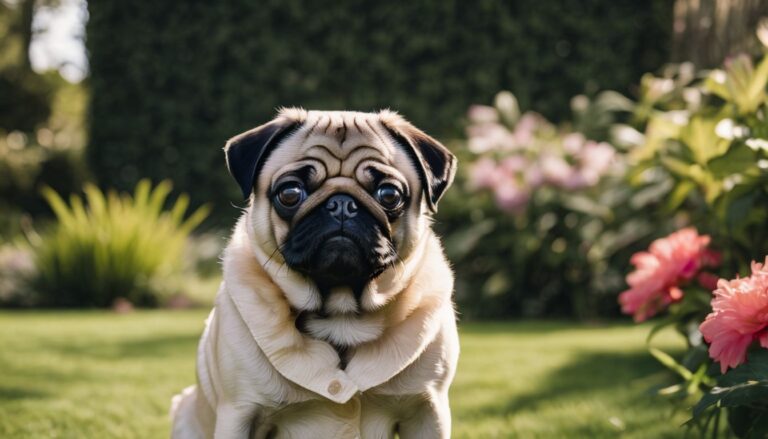Do Pugs Fart A Lot? Causes, Remedies, And Prevention For Excessive Flatulence In Pugs
Do Pugs Fart A Lot?
Pugs are not just pets; they’re part of the family, and their distinct charm can fill any home with joy. But let’s be honest—when our cuddly companions start to produce more gas than a little engine that could, it might test even the strongest of bonds.
If you find yourself in this familiar scenario, rest assured, you’re not alone on this breezy journey.
Our affectionate pugs may bring a giggle with their snorts and rolls but pack an unexpected punch with frequent flatulence. Sifting through heaps of information, I’ve pinned down why these lovable pooches tend to be so gassy—it often boils down to their distinctive shape and appetite quirks.
In the upcoming blog post, we’ll dive into the reasons behind your pug’s penchant for passing gas and arm you with some practical tactics to curb those less-than-charming emissions.
So stay tuned for genuinely actionable advice that will aim to keep both your hearts and noses clear when enjoying time with your four-legged friend!
Key Takeaways
- Pugs often fart more due to swallowing air while eating, their diet containing gas-inducing foods, digestive imbalances, food sensitivities, and underlying health issues. Slow feeders can help reduce ingested air.
- To minimize pug flatulence, provide a balanced diet with easily digestible proteins and limited human food scraps. Exercise helps digestion and reduces gas buildup.
- Regular vet visits are important to check for gastrointestinal problems that lead to increased farting in pugs. Dietary changes should be made gradually under veterinary guidance.
Why Do Pugs Fart?
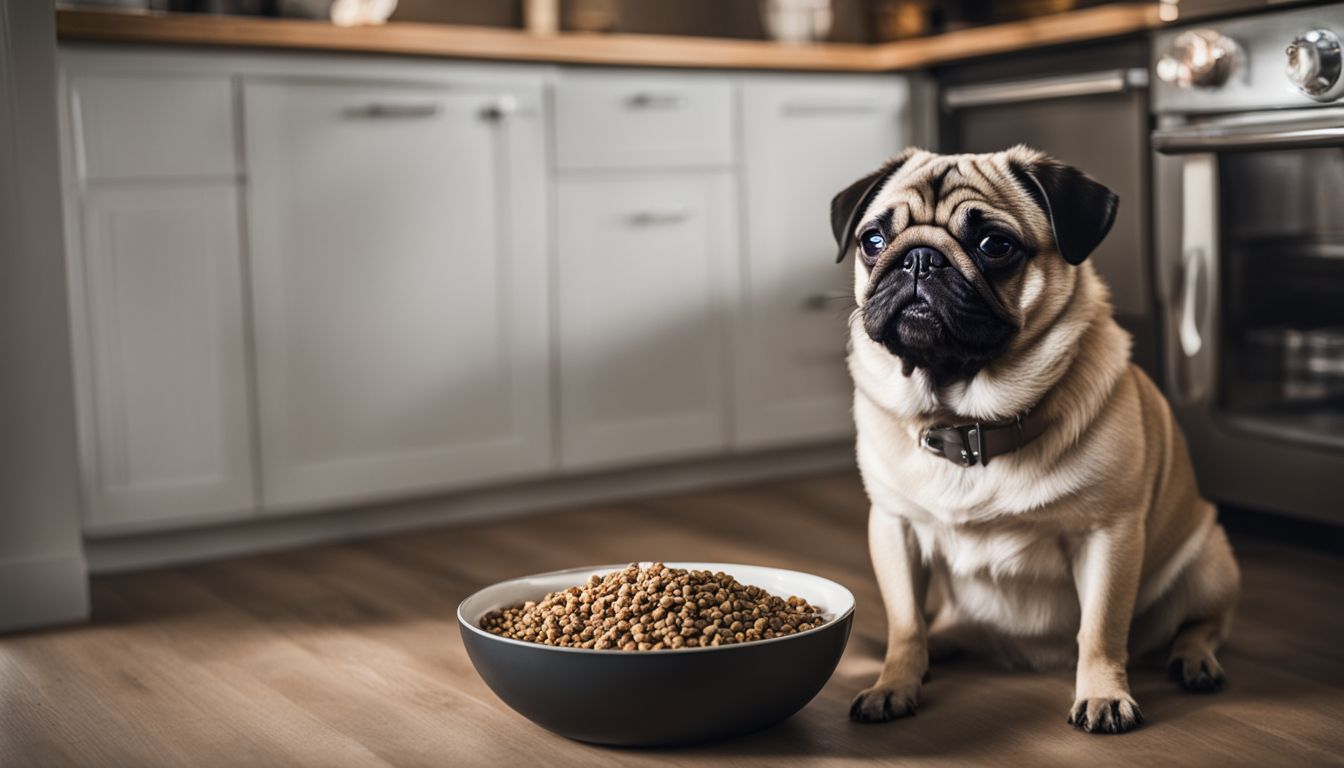
When it comes to our beloved pugs, their endearing faces and playful antics can sometimes come with a less charming trait: frequent farting. Let’s delve into the reasons behind this gassy phenomenon without repeating the common causes listed below, exploring how everything from their eating habits to their physiology contributes to those unexpected bursts of odor we often wish would stay at bay.
Swallowing air while eating
Swallowing air while eating is a common issue for our beloved pugs, and unfortunately, it’s part of why they may be passing more gas than we’d like. Their short snouts make them prone to gulp in extra air when munching on their meals or lapping up water.
This excess air travels through the digestive system and has to escape somehow, often leading to those not-so-silent but deadly farts that can clear a room.
We’ve found that using specific strategies can really help our little friends. One effective trick is incorporating slow-feeding bowls designed to make our pugs take smaller bites and eat at a leisurely pace.
By doing so, they ingest less air which means fewer embarrassing moments during family gatherings or quiet evenings at home. Let’s keep helping our pugs breathe easy and digest better—one slowed-down bite at a time!
Consuming fart-inducing foods
Moving from the air our pugs gulp down to what’s actually in their bowl, certain foods are notorious for turning up the volume on gassy episodes. Our furry friends have a knack for gobbling down anything we offer, but some human foods and dog treats are like fuel for flatulence.
Beans, dairy products, and high-fiber veggies can cause an uproar in their tiny tummies. Even though these might be healthy for us, they’re not always pug-friendly when it comes to digestion.
We should focus on serving food that supports their digestive system while limiting items that lead to gas production. Meat is a great source of protein for them, yet we must ensure it’s lean and not laced with rich fats that can make matters worse.
And though it might be tempting to spoil them with table scraps or indulge their puppy eyes during dinner time, remember that what’s good for our plate isn’t always good for our pugs’ palate or peace of mind at home where unexpected trumpet solos aren’t so amusing!
Digestive imbalance
Even though we try to avoid foods that can make our Pugs gassy, we sometimes overlook the possibility that there could be a digestive imbalance playing a role in their discomfort. A healthy gut teems with beneficial bacteria, but when these get out of whack, it can lead to trouble.
Our Pug’s little stomachs may not have enough good bacteria or they might even be trying to digest food that doesn’t quite agree with them.
This is where probiotics can become a real game-changer for our flatulent friends. By introducing more beneficial microbes into their diet, we support their digestive system and promote better nutrient absorption.
If your Pug struggles with frequent gas or bloating, consider adding veterinarian-recommended probiotics to its meals. These supplements help restore balance in the gastrointestinal tract and often reduce uncomfortable symptoms like smelly farts and burps.
Remember, keeping your dog’s gut happy is key to reducing those pesky pug farts!
Food sensitivities
We often overlook food sensitivities as a cause of excessive flatulence in Pugs, but they can play a significant role. Like us, our Pug pals may have adverse reactions to certain ingredients that upset their digestive system.
Identifying these sensitivities is crucial because continuing to feed your pug the wrong food can lead to discomfort and persistent gas issues.
To tackle this problem head-on, we must pay close attention to what goes into our Pug’s bowl. If you notice gases ramping up or changes in stool after introducing new food, it might be time for an elimination diet.
This means removing potential irritants like dairy products or grains and observing any improvements. Consulting with veterinarians can also provide insights into the best dietary choices for your furry friend and help discover any hidden intolerances that could be causing trouble for their tummy.
Other health problems
Bearing in mind food sensitivities, it’s crucial we also consider that our beloved Pugs might be facing other underlying health issues contributing to their excessive flatulence. Intestinal parasites, common yet often overlooked culprits, can disrupt the digestive system causing gas and discomfort.
A visit to the vet for a check-up is a smart move to ensure these unwelcome guests aren’t part of the problem.
Apart from parasites, conditions like inflammatory bowel disease or pancreatic insufficiency significantly impact your Pug’s ability to digest food properly, leading to more than just the occasional puff of gas.
Monitoring their gut health is essential; if you notice symptoms such as diarrhea or changes in stools coupled with farting more than usual, it’s time for professional advice. Keep an eye out for signs and act swiftly – your nose (and your Pug) will thank you!
What Do Pugs Eat? Understanding Their Diet and Its Impact on Flatulence
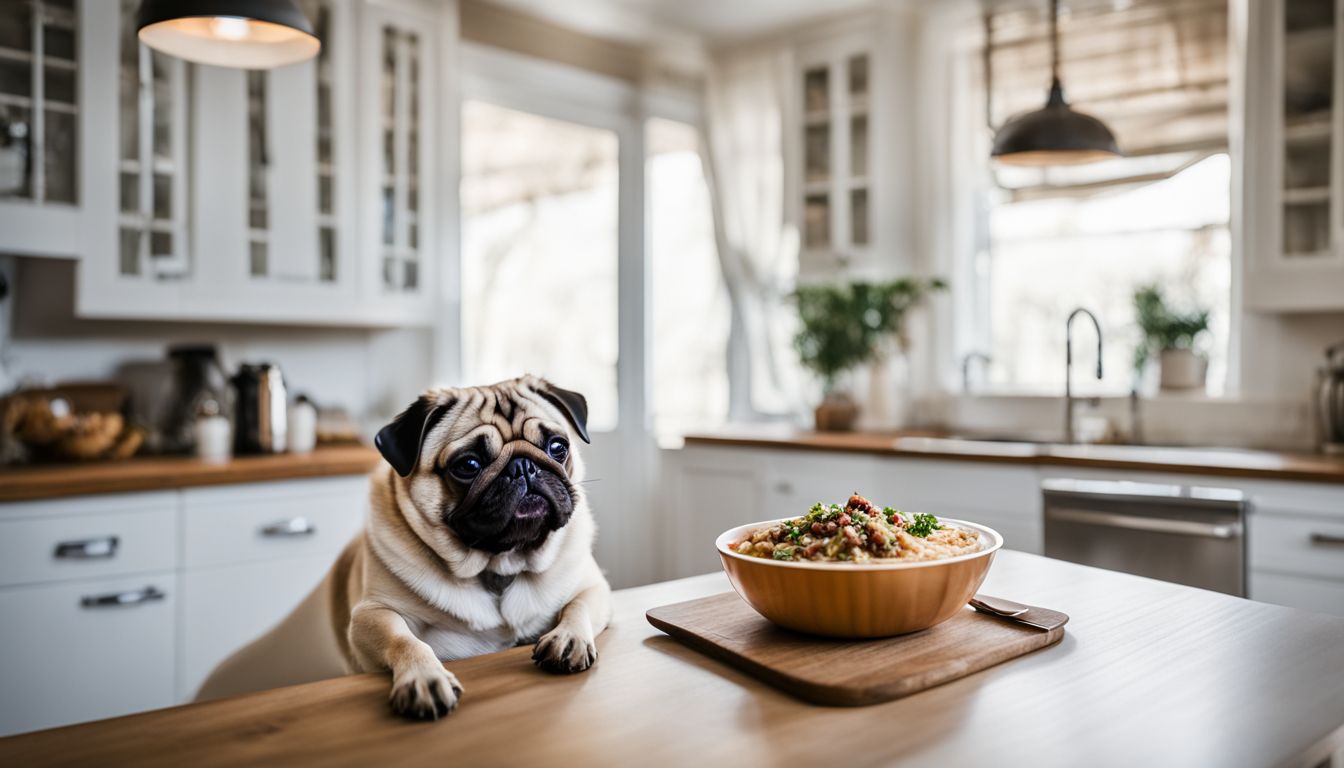
Pugs need a well-balanced diet that’s both nutritious and easy on their digestive systems to keep flatulence at bay. We choose high-quality dog foods rich in protein and low in fillers that can disrupt our pug’s stomach.
Whole meats like chicken, fish, or beef should be the primary ingredient in their meals — these are not only tastier for them but also much more digestible than cheap grains or meat by-products.
Keeping an eye out for food sensitivities is crucial because our beloved pugs may have allergies that lead to gas build-up. We introduce new foods slowly, watching for any signs of discomfort or increased farting before making it a regular part of their diet.
Ensuring they stay clear from lactose products and legumes helps cut down on those unwanted bursts of smelliness we know all too well. Regular vet visits support this process, helping us pinpoint the exact needs of our pug pals to maintain a happy belly free from excessive gas.
Do Pugs Fart More Than Other Dogs?
We often hear that our little friends pass gas quite a bit, and it’s true, they seem to fart more than many other dog breeds. Their distinctive shape plays a role in this. With short noses and flat faces, pugs tend to swallow more air whenever they eat or drink—air that has to come out somehow! Plus, being compact means their digestive systems have less space to work with, which can lead to quicker build-ups of gas.
It’s not just about the air they gulp down; what pugs eat also matters a lot. They may develop food sensitivities or allergies that disrupt their gut bacteria balance. This imbalance can turn even the best meals into a recipe for gassiness.
Foods high in fiber or hard-to-digest ingredients might contribute too much material for their little colons to handle smoothly. When we’re on top of these dietary issues and focus on feeding them easily digestible foods free from fillers, we take important steps towards reducing those smelly episodes.
How to Stop Pug Flatulence
To tackle the cheeky issue of excessive pug flatulence, discover in our next section how subtle adjustments to your furry friend’s lifestyle can lead to a more pleasant atmosphere for everyone around.
Slow-feeding bowls
Pug owners, we’ve all seen our furry friends inhale their food like they’re in a race. This often leads to them swallowing air, which can increase the chances of uncomfortable gas build-up and those not-so-pleasant dog farts we want to avoid.
Slow-feeding bowls are designed with obstacles that make dogs slow down and work for their food, significantly reducing the amount of air they gulp down during meals.
Incorporating slow feeders into mealtime routines is an easy change with big benefits for your Pug’s digestive health. These bowls encourage slower eating habits, helping prevent bloating alongside excessive flatulence, and promote better digestion overall.
They come in various fun shapes and sizes tailored to suit short-nosed breeds like our beloved pugs, ensuring that mealtimes become both engaging for them and beneficial to their wellbeing.
Avoiding table scraps
We all love to pamper our pets, but when it comes to Pugs, giving them table scraps can lead to some unpleasant consequences. Those bits of human food not only contribute to unhealthy weight gain but are also a significant culprit behind their excessive farting.
Human foods often contain ingredients and spices that aren’t suitable for a Pug’s digestive system, causing gas build-up and discomfort. Keeping those puppy dog eyes in check when we eat might be tough, but it’s essential for their well-being.
Sticking to a diet tailored specifically for Pugs makes a huge difference in managing flatulence. This means high-quality canine food that is easily digestible with the right balance of nutrients—a small sacrifice for happier moments with our furry friends without the pungent interruptions.
Next up, let’s take action with exercise—another vital step in keeping our Pugs healthy and reducing unwanted gases.
Exercise
Keeping our pugs active is crucial for their overall health and can significantly reduce gas problems. Regular walks, playtime at the park, or even short training sessions help them move around and aid in digestion.
Exercise also ensures they maintain a healthy weight, which is essential since overweight pugs are more prone to digestive issues that can lead to increased flatulence.
Encouraging our pug friends to engage in daily physical activity not only combats flatulence but also improves their cardiovascular health and strengthens their muscles. A game of fetch or a brisk walk around the block stimulates their body’s systems, including the digestive tract, helping food pass through more efficiently and minimizing those pesky fart episodes.
Plus, it’s a fantastic way for us to bond with our beloved furry companions!
Vet visit
After ensuring our pugs get regular exercise to aid in digestion and health, we shouldn’t overlook the importance of professional medical advice. Scheduling a vet visit can help identify any underlying gastrointestinal issues that may be contributing to your pug’s flatulence.
A veterinarian can perform a thorough examination and possibly recommend tests to pinpoint food sensitivities or allergies your furry friend might have.
During the appointment, openly discuss your pug’s diet with the vet; they can offer insights into what foods might trigger gas production and suggest alternatives. They’ll also examine whether your pug could be lactose intolerant or if their diet lacks certain vitamins that are crucial for proper digestion.
Sometimes, they might prescribe medications like simethicone or antacids to alleviate discomfort associated with excess gas. And don’t forget—keeping up with regular check-ups helps maintain not just gut health but overall wellness for our beloved pets.
Feeding Your Pug Puppy: Diet Adjustments to Prevent Flatulence
Pug puppies are adorable little bundles of joy, but their sensitive stomachs can cause some smelly problems. To keep your pug happy and your nose at ease, consider these diet adjustments to prevent flatulence:
- Introduce a high – quality diet gradually that’s rich in easily digested proteins to avoid upsetting your puppy’s stomach.
- Opt for dry kibble specifically designed for small breeds as it often contains the right balance of nutrients that pugs need.
- Include probiotics or yogurt with live cultures in their meals to help maintain a healthy microbiome and aid digestion.
- Divide meals into smaller portions fed throughout the day rather than giving one large meal; this helps reduce the amount of air swallowed and promotes better digestion.
- Check for food sensitivities by eliminating common allergens like wheat, corn, soy, and beef from their diet one at a time.
- Offer a low-residue diet that is low in fiber but still provides all necessary nutrients to minimize undigested matter in the intestines that may cause gas.
- Avoid milk and dairy products as many dogs do not have enough lactase enzymes to properly digest lactose.
- Increase exercise which helps stimulate digestion and reduce gas buildup; just be sure it’s tailored to suit your pug’s physical abilities.
- Stay consistent with feeding times and amounts because irregular habits can disrupt your pug’s digestive system.
- Talk with your vet about integrating supplements that contain folic acid or other vitamins which may benefit digestion for certain dogs.
Can Pugs Eat Pedigree? Analyzing Commercial Foods and Flatulence
Absolutely, Pugs can enjoy Pedigree as part of their diet, but it’s crucial to choose the right formulation. Pedigree offers a variety of foods that cater to different needs, including those designed for small breed dogs like pugs.
These formulations are crafted to be easily digestible and may help in reducing flatulence caused by food sensitivity or intolerance. However, not all commercial foods are created equal.
Some contain fillers and artificial ingredients that aren’t ideal for our pug’s digestive system and could contribute to excess gas.
It’s essential we read labels and pick options that have high-quality protein sources without too many additives which can exacerbate gas problems. Also adding probiotics or looking for food with these beneficial bacteria already included can aid digestion and cut down on those smelly fart episodes we want to avoid.
After considering Pedigree, let’s explore other dog breeds known for their gassy nature.
Other Dog Breeds That Fart Frequently
Shifting our focus from Pug diets to the canine world at large, it’s clear that pugs aren’t the only dogs that experience flatulence. Many breeds share this gassy trait for various reasons, including their size, diet habits, and physical characteristics. Here are some other dog breeds that are known to pass gas frequently:
- Boxers also have short noses, which causes them to swallow a lot of air – just like pugs. This can lead to more farting as they digest their food.
- Bulldogs possess similar brachycephalic traits and often have sensitive digestive systems, making them prone to passing gas.
- Labrador Retrievers love to eat quickly and may not always chew their food properly. This fast eating can cause them to ingest extra air, leading to flatulence.
- Golden Retrievers are similar to Labradors in their enthusiastic eating habits and can suffer from the same gassy consequences.
- German Shepherds have powerful digestive systems but sometimes struggle with gastrointestinal issues that can increase flatulence.
- Pit Bulls might be muscular and strong, yet they often face food allergies or intolerance that contribute to gassiness.
- Beagles are scent hounds with big appetites which sometimes lead them to eat things they shouldn’t, causing more gas production.
- Doberman Pinschers require high – quality diets but if fed improperly or too quickly, they may also experience excessive flatulence.
Tips for Reducing Pug Flatulence
If you’re a fellow pug lover, noticing that your furry friend passes gas more often than seems normal can be concerning—and let’s be honest, a bit smelly! We’ll explore some tried-and-true strategies to help reduce your pug’s flatulence, ensuring both you and your pup can breathe easier.
Rule out gastrointestinal issues
We all love our Pugs, but their comfort is key, so let’s talk about keeping those little tummies happy and healthy. Gastrointestinal issues can play a big role in why your Pug passes gas more than usual.
Certain conditions like inflammatory bowel disease or intestinal parasites aren’t just uncomfortable for them; they can lead to excessive farting. If you’ve noticed an uptick in your furry friend’s flatulence, it might be time for a trip to the vet.
Getting professional advice is crucial since these health experts can pinpoint exactly what’s going on inside that cute belly of theirs. Your vet may perform tests to confirm whether there’s any food intolerance affecting digestion or if something more serious needs attention.
They’ll help guide you towards the right diet changes or medications such as simethicone or antacids that could greatly reduce farting and ease their discomfort – ensuring your beloved Pug feels better and leaves less of a scent trail behind!
Slowly change the dog’s diet
To help our Pugs cut down on those pesky farts, we need to ease into new feeding habits. Gradually switching their diet can make a big difference. If you’ve pinpointed certain foods that cause your Pug to pass gas more often, swap them out.
Start by mixing a little bit of the new food with the old one they are used to eating. Then, over the course of several weeks, slowly increase the amount of the new food while decreasing the old.
This gives your furry friend’s digestive system time to adjust without causing upsets.
As we alter their diets for better digesting results, it’s also crucial not to overlook other parts of their routine that could be contributing to flatulence issues—like diving into table scraps and raiding trash which should be avoided at all costs.
Moving forward from dietary changes, let’s talk about how avoiding these habits along with limiting gas-inducing treats will benefit our beloved Pugs even further.
Avoid table scraps and trash
As we consider changing our Pug’s diet to improve their digestion and reduce flatulence, we also need to look at what they’re scavenging outside of meal times. Giving in to those big, pleading eyes and feeding table scraps can lead your Pug down a road ripe with digestive distress.
Foods that aren’t part of their regular diet often contain fats, spices, or ingredients that are difficult for them to digest. These items may trigger excessive gas or even more serious health problems.
Keep trash cans secure and out of reach from curious paws. Our furry friends might not differentiate between fresh kibble and yesterday’s leftovers in the garbage but their stomachs surely do.
Items like spoiled food, bones, or other waste can be hazardous if ingested by your pet. Maintaining a clean environment where trash is tucked away will help prevent your Pug from snacking on something that could upset their system and contribute to unwanted gassiness.
Limit fart-inducing foods
Moving on from table scraps, let’s talk about the food items in our Pug’s regular diet that might be causing those unexpected gassy outbursts. Some foods naturally produce more gas when they break down in the digestive system.
For instance, beans, dairy products, and certain fruits and vegetables are known to lead to farting in dogs just as they do in humans.
We should focus on providing meals that contribute to their overall health without leading to discomfort from too much flatulence. This means being mindful of what goes into their bowl.
Simple changes like avoiding soybeans, peas, and anything high in fermentable fiber can make a big difference. By carefully selecting our furry friends’ menu options with these considerations in mind, we help them stay happy and less likely to clear a room with a single poot!
Slow down speed eating
We’ve seen our adorable pugs wolf down their meals as if there’s no tomorrow. It’s important to slow down their eating to reduce the risk of gas buildup in their little tummies. Speed eating causes them to swallow more air, which contributes significantly to those not-so-pleasant puffs of flatulence we’ve all come to know.
Using a slow-feeder bowl can make a huge difference. These bowls are designed with ridges and mazes that force Fido to eat at a more leisurely pace, cutting down on the air intake and helping digestion.
Let’s tackle this head-on by making mealtime longer and more challenging for our furry friends. We can also split their daily food ration into smaller, frequent meals instead of one big feast — another effective strategy for minimizing swallowed air during chow time.
And frankly, it keeps them happier too! Regular exercise after eating is key as well; it boosts metabolism and aids in moving that food along through their digestive system before it has the chance to ferment into gas.
What to Give Your Pug for Stinky Gas
In tackling stinky gas, we often recommend adding a spoonful of plain pumpkin to your Pug’s meals. This fibrous addition can aid digestion and reduce the occurrence of gas. Probiotics are another go-to; they introduce beneficial bacteria into your Pug’s gut, which helps break down food more efficiently and keeps bad bacteria from causing odors.
Small portions fed throughout the day instead of big meals can also prevent your Pug from gulping too much air, one of the main culprits behind those unwanted smells.
Choosing easily digestible proteins for your pug’s diet is essential—think white meats like chicken or fish that won’t strain their system as red meats might. Always avoid foods known to cause flatulence such as dairy products or high-fiber vegetables since these can exacerbate gassiness in sensitive dogs like Pugs.
Keep an eye on treat intake too; it’s easy to overdo it with snacks that could be upsetting their stomachs. As you continue caring for your pet’s digestive health, don’t forget about regular exercise – not only does it keep them fit but also supports better overall digestion leading up to our next topic: Understanding Your Pug’s Emotional Needs.
Do Pugs Fart A Lot Conclusion
Let’s help our pug friends lead more comfortable and less gassy lives. By understanding the causes of their flatulence, we can make smart choices about what they eat and how they dine.
Simple changes like exercise, diet adjustments, and regular vet checkups can make a big difference. Remember, prevention is key—our small steps will ensure fewer interruptions from those amusing but smelly pug toots.
Let’s keep our noses happy as we cherish every moment with these adorable companions!
Do Pugs Fart A Lot FAQs
1. Why do pugs fart more than other dogs?
Pugs tend to fart a lot because they often gulp air while eating, which can cause gas. Their diet and digestive issues also play a role in their excessive flatulence.
2. What can I do to reduce my pug’s farting?
To cut down on your pug’s farts, feed them smaller meals throughout the day, avoid foods that cause gas, and make sure they get plenty of exercises.
3. Are there any home remedies for a gassy pug?
Yes! For a gassy pug, try adding some pumpkin or plain yogurt to their food as it can aid digestion. Also ensure fresh water is always available.
4. When should I worry about my pug’s flatulence?
If your pug’s farts are very frequent or smelly beyond what seems normal, it might be time to check with the vet for any underlying health issues.

